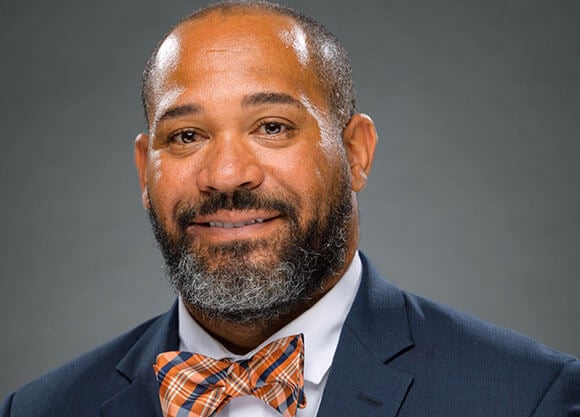
Veteran finds confidence, purpose in his Quinnipiac journey
October 21, 2021

October 21, 2021

Rivera was born in Puerto Rico and joined the Coast Guard in 1997. Over the years, he was assigned to stations in Miami, New London and New Haven. During his final months of duty, Rivera used vacation time to begin classes at Gateway Community College.
“After so many years of serving in the military, I knew who I was in uniform, and I was trying to figure out who I was outside the uniform,” said Rivera.
Rivera saw glimpses of what college could be through his oldest son’s experience, as he will graduate from Eastern Connecticut State University a semester ahead of his dad’s upcoming Spring ’22 commencement. Rivera’s younger son is a semester behind him at Southern Connecticut.
“As an adult over 40, I had to deal with my own securities about attending college,” said Rivera. “Having children in college at the same time gave me a clear perspective of college life and portrayed the possibility in a good way.”
Rivera decided to transfer schools in Fall 2018 and toured several local universities to find the best match. Of the campuses he visited, Quinnipiac was the most welcoming.
“During one of our initial conversations, Director of Veteran and Military Affairs Jason Burke referred to me as a Quinnipiac student, as if I was already a Bobcat,” said Rivera. “He said ‘when you come here,’ and ‘when you get accepted’ - not ‘if.’”
After a smooth transition from Gateway, Rivera began classes at Quinnipiac. His original plan to major in political science was influenced by his upbringing in urban communities, and a desire to work on public policy affecting these types of neighborhoods, said Rivera.
A principles of microeconomics class, led by chair and Professor of Economics Donn Johnson, changed Rivera’s viewpoint.
During a lecture, Johnson demonstrated how to solve the health care crisis through a series of four graphs.
“I was hooked. I didn’t immediately know what the graphs meant, but I intuitively understood the magnitude of it,” said Rivera.
When he decided to transfer from the political science department, Rivera was encouraged to create an independent major.
He chose to meld focuses on urban economics and public policy. After his proposal was accepted, Rivera selected classes in political science, economics, sociology and Spanish (in which he is fluent) for his curriculum.
Now in his senior year, Rivera’s seminar thesis dissects the economic effects of gentrification on urban communities.
“I added several disciplines, as the way economist may look at this question is slightly different than a how a sociologist would look at it. I had to find a balance how each role would answer the question, because often the answers would be opposite,” he said.
Through thoughtful analysis and debate around these topics, Rivera engaged in a level of discourse he hadn’t experienced.
“I was coming from the military world, where most of the time we don’t have conversations; we have orders. By entering an academic setting where we are here to debate and question, Quinnipiac allowed me to grow,” said Rivera.
He also notes a change in his leadership style, in terms of how to properly assess and respond to a situation in civilian conditions.
As Rivera’s time at Quinnipiac draws to a close, the confidence he’s gained as a learner and leader resounds.
“For veterans, for non-traditional students at my age, it feels like a positive community where everyone’s ideas, comments and beliefs are respected,” said Rivera. “I’m continuously amazed and inspired by the drive, commitment and brilliance of the young adults I am lucky to call my QU peers.”
Quinnipiac Today is your source for what's happening throughout #BobcatNation. Sign up for our weekly email newsletter to be among the first to know about news, events and members of our Bobcat family who are making a positive difference in our world.
Sign Up Now